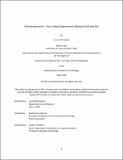Rearrangements – Four Urban Experiments Between Soil and Sky
Author(s)
Senise, Luca Smith
DownloadThesis PDF (3.779Mb)
Advisor
Urbonas, Gediminas
Terms of use
Metadata
Show full item recordAbstract
In this thesis, I situate my creative practice as an architect-artist in the fields of urban intervention, ontological design and experimental worldbuilding. My projects involve prototyping arrangements in urban space that contain ideas currently excluded from modern colonial urban design. These ideas, both specific and broad, include holding resources in common, the idea that public corridors could be places of life rather than only movement, the idea that individual citizens should be empowered to contest the conditions they live in, or the even bigger idea that the world is not an inanimate bank of resources (as Enlightenment thinking would have it) but in fact an interdependent, living collection of relationships.
How might the act of intervening in urban space suggest new arrangements? I argue that urban intervention as an artistic method exists between craft and design, taking craft as a means of operating directly in the material world and design as an act of translation between an intention and a form. Examining a variety of precedent practices, particularly the work of Flavio de Carvalho (Brazilian polymath, b.1899) and the Design Studio for Social Intervention (Boston-based design group, “ds4si”), I understand urban intervention as a method that has a double-power in both a material dimension and an abstract dimension. I then use the analytical framework developed by ds4si, “Ideas-ArrangementsEffects” to consider the relationship between physical prototypes and the social ideas present in my work.
The thesis chronicles four projects (1. Rhythmwalk, 2. Citizen Chair, 3. Free Rain/Free Rein, 4. Boston Lead Gardens) undertaken as a student in the Art, Culture and Technology program at MIT, revealing an evolving set of methodological approaches to creating urban interventions: from independent to collective, with permission and without permission, between curiosity and intention. The thesis concludes with a meditation on what it means to belong to the ground that supports us and an evaluation of the arc the four projects have taken.
Date issued
2023-06Department
Massachusetts Institute of Technology. Department of ArchitecturePublisher
Massachusetts Institute of Technology